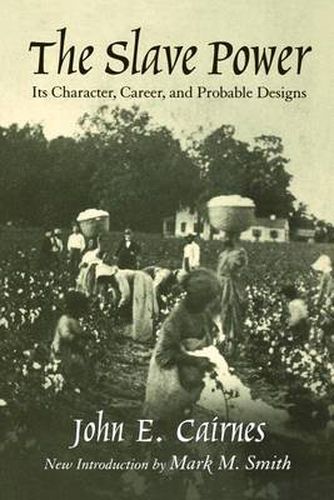Readings Newsletter
Become a Readings Member to make your shopping experience even easier.
Sign in or sign up for free!
You’re not far away from qualifying for FREE standard shipping within Australia
You’ve qualified for FREE standard shipping within Australia
The cart is loading…






An early assessment of the contest between an economically defunct and politically aggressive Southern slave power and a liberal, free-wage-labor North
The Slave Power, John E. Cairnes’s seminal work on slavery, was widely acclaimed upon publication in 1862 as a brilliant attempt both to explain the essential cause of the American Civil War and to shape European policy concerning the struggle. It remains among the most important works on the political economy of Southern slavery. When Cairnes–one of the nineteenth century’s preeminent classical liberal economists–characterized Southern slavery as inefficient and backward, his opinions carried enormous weight, earning him applause in the North and castigation in the slave- holding South. Casting the Civil War as a contest between an economically defunct and politically aggressive Southern slave power and a liberal, capitalist, free-wage-labor North, Cairnes offered an interpretation of the origins of the Civil War that has remained as compelling and controversial as it was when first published.
Mark M. Smith’s new introduction to the work places The Slave Power in historical context by explaining the intellectual milieu in which the book was written (including a treatment of classical liberal economic thought in Great Britain), the book’s friendly reception in Union circles, and its rejection by war-torn Confederates. Smith also traces the book’s reception by successive generations of historians of the slave South.
$9.00 standard shipping within Australia
FREE standard shipping within Australia for orders over $100.00
Express & International shipping calculated at checkout
An early assessment of the contest between an economically defunct and politically aggressive Southern slave power and a liberal, free-wage-labor North
The Slave Power, John E. Cairnes’s seminal work on slavery, was widely acclaimed upon publication in 1862 as a brilliant attempt both to explain the essential cause of the American Civil War and to shape European policy concerning the struggle. It remains among the most important works on the political economy of Southern slavery. When Cairnes–one of the nineteenth century’s preeminent classical liberal economists–characterized Southern slavery as inefficient and backward, his opinions carried enormous weight, earning him applause in the North and castigation in the slave- holding South. Casting the Civil War as a contest between an economically defunct and politically aggressive Southern slave power and a liberal, capitalist, free-wage-labor North, Cairnes offered an interpretation of the origins of the Civil War that has remained as compelling and controversial as it was when first published.
Mark M. Smith’s new introduction to the work places The Slave Power in historical context by explaining the intellectual milieu in which the book was written (including a treatment of classical liberal economic thought in Great Britain), the book’s friendly reception in Union circles, and its rejection by war-torn Confederates. Smith also traces the book’s reception by successive generations of historians of the slave South.